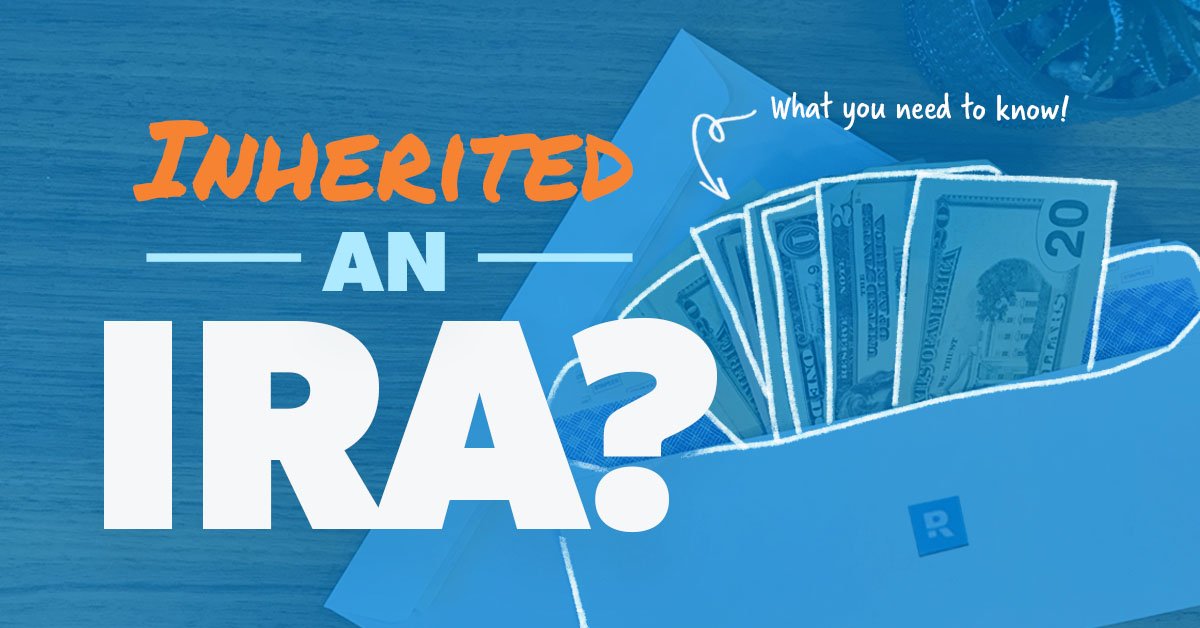Inheriting an IRA? Here’s What You Need to Know
8 Min Read | Sep 4, 2024

A loved one passes away and a family member ends up wondering what to do with the money they inherited from an IRA or 401(k) they left behind. Does that sound familiar? It happens all the time.
Maybe it was a parent who worked tirelessly for years and years to leave behind a legacy for their children. Maybe it was a spouse who suddenly passed away, leaving behind retirement savings meant for the future you both dreamed of living out someday.
If those are the shoes you find yourself in, we know it can be stressful to be in the midst of grieving the loss of a loved one while figuring out what to do with thousands—or maybe even hundreds of thousands—of dollars they left behind for you to manage in an inherited IRA. That’s a lot of pressure!
Market chaos, inflation, your future—work with a pro to navigate this stuff.
Remember that an IRA inheritance is meant to be a blessing. And one of the best ways you can honor their memory is to manage it the right way. But first, it’s important to know what your options are and what you can and can’t do with that inherited IRA or 401(k) money.
What Are My Options if I Inherit an IRA or 401(k)?
The truth is your options will be different depending on who you’re inheriting the IRA or workplace retirement plan from.
Here are some questions you need to ask yourself: Did you inherit the IRA from a spouse or from someone who isn’t your spouse? How old were they when they passed away? Was it a traditional IRA or a Roth IRA? How you answer those questions will determine what you’ll be able to do with that inherited money, but there are basically three options to choose from:
- Option #1: Take a Lump Sum Payment
- Option #2: Open an Inherited IRA
- Option #3: Rollover the Funds Into Your Own IRA (The Spousal Transfer)
Let’s break each one of those options down one by one!
Option #1: Take a Lump Sum Payment
This is probably the simplest option you could take. In this case, you would take all the money that was in the IRA or workplace retirement account as a lump sum payment. Anyone can choose to take the lump sum payment—it doesn’t matter who you inherited the IRA from.
This option has some advantages, but it also comes with some drawbacks. The good news is you can take the lump sum payment without taking a 10% early withdrawal penalty and you’ll have access to that money right away. The bad news is that you’ll have to pay taxes on the money if it was in a tax-deferred account—like a traditional IRA or traditional 401(k)—and lose out on any potential future growth if you kept the money invested.
But watch out! Because depending on your income and the size of the lump sum payment, this option could knock you into a higher tax bracket and leave you with a massive tax bill. So if this is the route you want to go, work with a tax advisor and make sure you set aside enough money to pay Uncle Sam.
When does taking the lump sum option make the most sense? If you are on Baby Step 2 or 3 (that means you’re trying to pay off all your non-mortgage debt or trying to build an emergency fund), it might be a good idea to take the lump sum to speed up your debt snowball or beef up your emergency fund.
But if you don’t need the money right away, you might want to look at some other options. Which leads us to . . .
Option #2: Open an Inherited IRA
An inherited IRA is a brand-new account that will be opened in your name, using the funds from the original owner’s IRA that was left to you. When someone close to you passes away and leaves funds from an IRA or employer workplace retirement plan to you as an inheritance, you’ll roll those funds over to an inherited IRA. Simple!
This option is also available to everyone, no matter who you inherited the IRA or workplace retirement plan from. If you don’t need to use the money right away to pay off debt, then this might be the best option for you. That’s because it will give the inherited money a chance to continue to grow and you get to spread what you might owe in taxes into more manageable chunks over a longer period of time.
Now, you can take money out of an inherited IRA (without having to pay an early withdrawal penalty) in one of two ways, depending on who you inherited the IRA from and when you inherited the account:
The Life Expectancy Method
This method is basically a simple math problem. Generally, you divide the amount of money left in the original owner’s retirement account by how many more years you are expected to live for (according to the IRS’s Life Expectancy Table).1 For example, if you are inheriting $100,000 from your spouse and your life expectancy is 30 years, you’ll be taking out $3,333 from your inherited IRA each year.
This method is generally reserved for folks inheriting an IRA from a spouse. But if you are inheriting an IRA from someone who is not your spouse, you can only use the life expectancy method if one of the following applies to you:
- You inherited the money from someone who died in 2019 or earlier.
- You are chronically ill or disabled.
- You are no more than 10 years younger than the deceased account owner.
- You are a minor child of the deceased account owner. In that case, you can use the life expectancy method only until you reach age 18.
If you don’t fall into any of those categories, then you’ll have to withdraw all the funds in the inherited IRA within 10 years. Speaking of which . . .
The 5-Year or 10-Year Method
With this method, you can take as much or as little money out of your inherited IRA at any time . . . but all the money must be completely withdrawn in five or 10 years. If you don’t withdraw all the money in time, you’re looking at a huge penalty on whatever remains in the account. So get that money out of there before the deadline, people!
If the original owner died in 2019 or earlier, you have five years to withdraw all the money from an inherited IRA. You’ll have 10 years if they died in 2020 or later.
Option #3: Rollover the Funds Into Your Own IRA (The Spousal Transfer)
If you inherited an IRA from your spouse, you have an extra option that isn’t available to anyone else—it’s called the “spousal transfer.” This exception allows you (the surviving spouse) to move the funds from your spouse’s retirement account into your own existing IRA.
Once the money is in your existing IRA, those funds will be treated like the rest of the money in your IRA. That means the inherited money will now be subject to the same rules for withdrawals, contribution limits and penalties. For example, if you’re under age 59 1/2 and decide to take the money out of the account, you’ll have to pay the early withdrawal penalty.
Invest Like No One Else
From investing advice to wealth management, find a SmartVestor Pro who speaks your language.
Ramsey Solutions is a paid, non-client promoter of participating pros.
Do I Have to Pay Taxes on Withdrawals From an IRA or 401(k) I Inherited?
It depends! Usually, the money you take out will be taxed the same way it would have been with the original owner of the account.
Like we mentioned earlier, if you inherited a tax-deferred retirement account like a traditional IRA or traditional 401(k), then the answer is yes. The money you take out from an inherited tax-deferred account will count as taxable income and you will have to pay income taxes on that money.
What if your loved one left you a Roth IRA or Roth 401(k)? Since the account’s original owner funded the account with money that was already taxed, you can either open an inherited IRA or do a spousal transfer and continue to enjoy tax-free growth and tax-free withdrawals.
There is one exception: If you take the lump sum payment or make withdrawals and the account was less than five years old when the original account owner died, then that money is taxable.
All this tax talk is enough to make anyone’s head spin! To clear up any tax questions you might have about any retirement accounts you are inheriting, get in touch with a tax advisor who can guide you through the process.
Work With a Financial Advisor
Okay, folks. That's a lot of information to digest. And if you're reading this, you may need to take some time to process the loss of a loved one. So don't make any quick decisions—that money's not going anywhere. Just let it sit there for a little while.
And don’t forget that you’re not in this alone. This is the time to lean on your family and friends for emotional support and also to reach out to a financial advisor who can help you navigate some of the complexities of handling an inheritance.
If you don’t have a financial advisor or investment professional in your corner, you can use our SmartVestor program to find one in your area. These pros can help you make a plan that will prepare you to manage this inheritance well.
This article provides general guidelines about investing topics. Your situation may be unique. To discuss a plan for your situation, connect with a SmartVestor Pro. Ramsey Solutions is a paid, non-client promoter of participating Pros.



